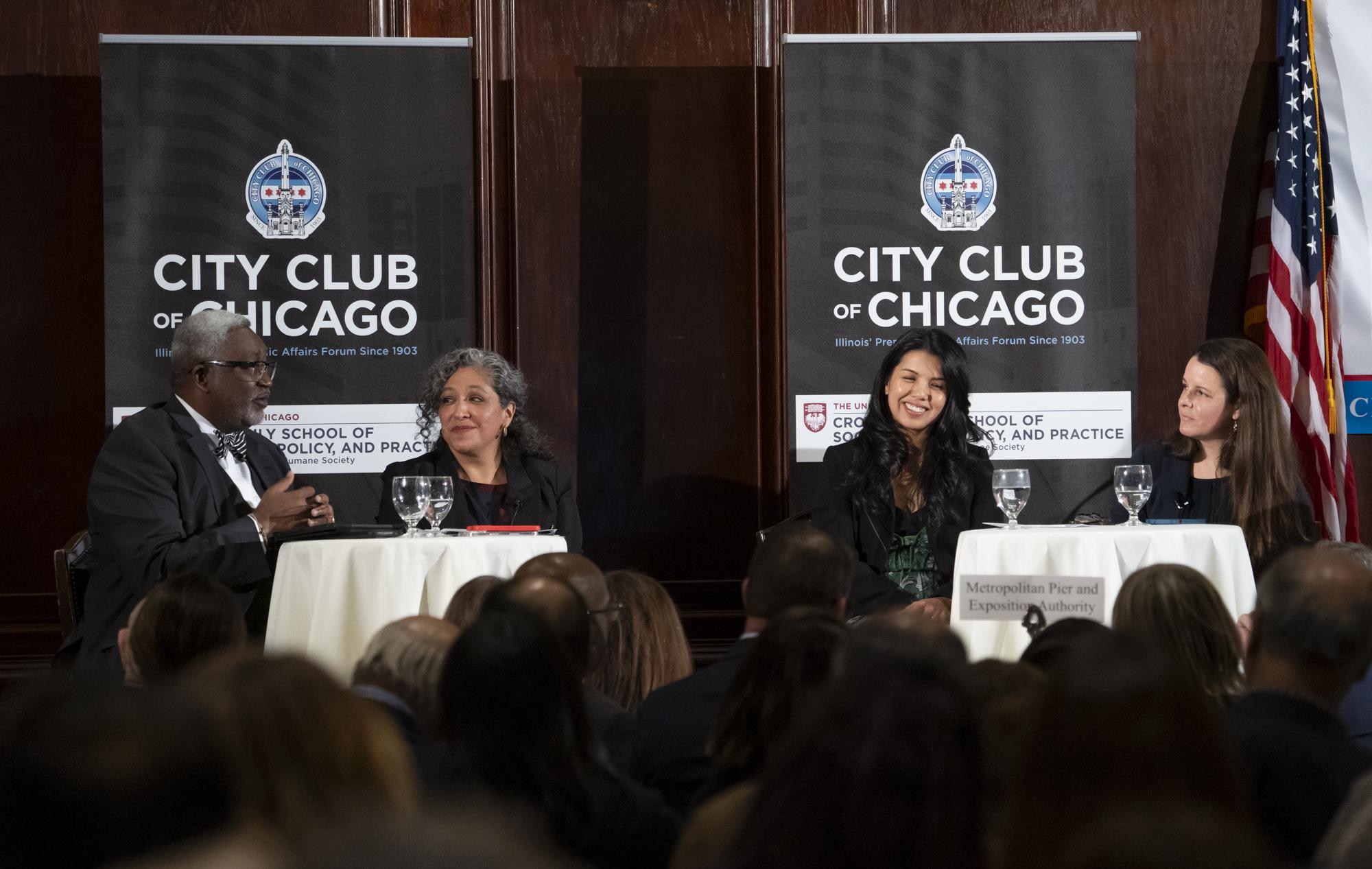
A successful approach to helping migrants helps build a system that helps everyone
By Sarah Steimer
“Understanding and Navigating Chicago's Migrant Population,” hosted by the City Club and The Crown Family School of Social Work, Policy, and Practice brought together community leaders to discuss how to manage the influx of arrivals"
The great number of migrants coming to Chicago can feel like a problem that has grown faster than it can be easily managed. But community and political leaders in the city are confident that a thoughtful approach can ensure a system that doesn’t just work for the new arrivals but can help create a blueprint for all Chicagoans in need.
On Monday, Oct. 30, the City Club of Chicago and the Crown Family School of Social Work, Policy, and Practice co-hosted a panel discussion exploring the consequences and complications of the city’s migrant situation. With an influx of more than 19,000 migrants in just the past two months, the city has had to balance striking a welcoming tone with the strain on housing, resources, and neighbor relations.

The panel, moderated by WBEZ reporter Kristen Schorsch, included Aimee Hilado, assistant professor in the Crown Family School; Rev. Kenneth Phelps, of the Concord Missionary Baptist Church, and Beatriz Ponce De León, the Deputy Mayor for Immigration, Migrant, and Refugee Rights for the city.
The event began with a conversation about mental health services. Hilado explained that a migrant’s decision to leave their home country is not an easy one, but they feel they have no other choice. “What we know is the compounding effects of trauma and stress along that journey can directly influence how well they're able to adapt and adjust to life here in Chicago,” she said. Basic needs are important, of course, but to be able to adapt and survive, new arrivals need mental health support as well.
To see the sheer number of migrants in the city, to look at the emergency context — there’s no map for responding, Hilado said. And untreated mental health problems will get in the way of building a life. Reimagining Mental Health Supports for Migrant Arrivals — a project she developed with colleagues from Lurie Children's Hospital — takes a public health approach to mental health. The program helps train non-clinical Spanish-speaking frontline providers from community-based organizations to be the first line of support in promoting universal strategies for mental health. This strategy, she emphasized, can extend to any community impacted by trauma.

Rev. Phelps offered his perspective as a faith leader, seeing his role as offering hope in addition to resources. He said the shelters are filled with talented and gifted individuals who just need some support in gaining the right credentials, housing, and employment opportunities. And faith-based organizations are interested in being part of the solution.
Ponce De León clarified what the city government is doing but first noted that Chicago has been a city of immigrants since its founding. She said that previous immigrants have become part of our communities in large part because they have come with the infrastructure and the funding to help them become part of Chicago. Now, however, cities are being asked to do the work of the federal government and resettle large numbers of migrants.
The current administration’s goal is to take a long view, Ponce De León said: How do we help people become productive, healthy parts of our community and really become part of the fabric of Chicago? But while the city has opened 25 shelters, it hasn’t been able to keep up with the pace of incoming migrants. What’s desperately needed, she said, is federal coordination of a resettlement program across the country. President Biden did announce a budget request for this effort, and Chicago is advocating for a large portion of that pot.
Much of the conversation focused on how to not just manage today’s needs, but how to create a system in the city that continues to set migrants up for future success, as well as future populations and those existing residents who need assistance.“Everything that we're doing now is building an infrastructure that will be better for the next time there are climate refugees and other migrants who are coming to Chicago,” Ponce de León said.
Among the audience questions were requests for what they could do to help, along with concerns over anti-migrant attitudes in the city. As Hilado acknowledged, when a city is perceived as being unsafe, unwelcoming, or even threatening, it makes adjustment that much harder.
Ponce de León said the city is working on a call to action that will engage different sectors across Chicago in specific working groups and other initiatives. The goal is to bring people together in a more structured way and come up with creative solutions that the government might not come up with — and then partner with the community on implementation as well.
The panelists all spoke about the importance of making the solutions sustainable. Once one group is settled, Phelps said, there will still be others who need support. “If we begin to just see them as humans, we create these structures so that organizations are able to service anyone in those particular communities,” he said.
Hilado said that, if anything, the migrant crisis has actually highlighted the many communities that have been disinvested in and under-resourced. There are communities that watch what is happening and wonder: What about me? But if the right steps are taken today, it can set the whole city up for success.
Watch the Live Stream from the Event